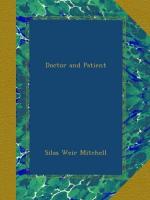This is a fair specimen of a master at his best. I would rather have trusted Sydenham, with all his queer theories, than many a man with the ampler resources of to-day; for his century may aid but does not make the true physician, who is not the slave, but the master, of opinions.
To enforce again the fact that the greater men of my art, even in days of the most extreme theories, were more sensible in their daily practice than in their dogmatic statements, I would like to quote a letter of Rush, which for several reasons is interesting and valuable. No man was more positive in his beliefs and in the assertion of them than he. His name is still associated with bleeding and purging, and if we considered only some of his written assertions, made with the violence which opposition always aroused in his positive nature, we should pause in wonder at his great reputation. But what a man says or writes, and what he does, are often far apart. We are apt to take his most decisive statements as representative, and thus may seriously err. I have known a number of men who were really trustworthy physicians, and who yet were credited by us with a fondness for absurd ideas, which, in fact, influenced their writings far more than their practice. Rush was to some extent one of this class. His book on insanity is far in advance of his time, and his descriptions of disease one of our best tests, most admirable. Let us see how this physician who bled and dosed heavily could think and act when face to face with a hopeless case. The letter to which I have referred was given to the College of Physicians of Philadelphia at my request by one of its associate fellows, Dr. Hunter Maguire, of Richmond, Virginia. It is written to Rush’s cousin, Dr. Thornton, in 1789, and has an added interest from the fact that it is a letter of advice in the case of the aged mother of Washington, who had a cancer of the breast.
“Philadelphia, July 6, 1789.
My dear Kinsman:




